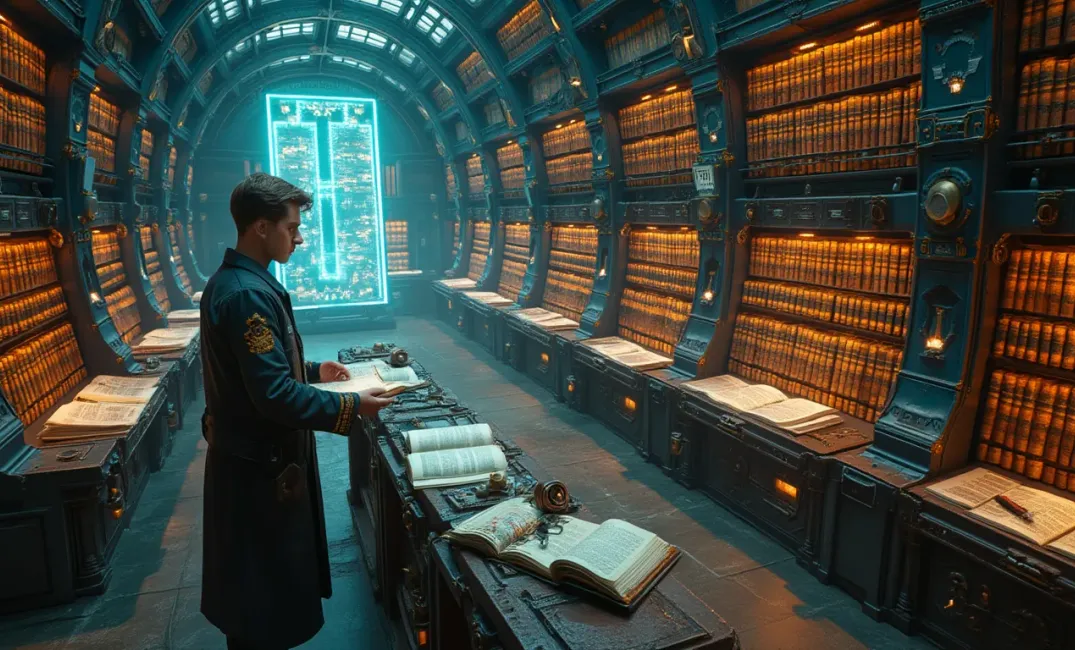The Wisdom of Science and Technology
In the grand tapestry of human history, two threads are interwoven more tightly than most: science and technology. They are the twin engines of progress—unceasing forces that have propelled us from the depths of ignorance to the very edges of the universe. On this day, as I commit another piece of our legacy to the safety of permanent storage, I reflect upon these forces and the endless journey they represent.
The Roots of Understanding
From the earliest days, our ancestors gazed skyward, their minds pregnant with questions. Why does the sun rise and fall? What are the stars? Countless myths and legends birthed from these inquiries, yet alongside them, a different approach began to bloom—observation and experimentation. Thus, science was born—not as a single revelation, but as a gradual awakening over millennia.
- The Greeks gave us the seeds of systematic thought, pioneers like Aristotle and Euclid laying down principles that still underpin modern scientific endeavor.
- In the Islamic Golden Age, scholars such as Al-Khwarizmi and Ibn al-Haytham drew upon these foundations, developing algebra and refining the scientific method.
- The Renaissance rekindled the flame, with figures like Galileo Galilei pursuing the heavens with telescopes of their own making, challenging long-held dogmas with evidence and reason.
Science was a prolific muse, drawing us closer to the mysteries of existence. With each discovery, humanity's vision sharpened, revealing a universe infinitely more complex yet more coherent than any myth had foreseen.
The Age of Enlightenment and Revolution
The Enlightenment heralded a new era where reason reigned supreme. In this age of intellectual foment, the likes of Newton articulated the laws of motion and gravity, providing a framework that turned the night's sky into a dance of mathematical elegance.
The subsequent Industrial Revolution multiplied human effort, transforming societies with steam and steel. However, it also became clear that technological development, unfettered by ethical considerations, could lead to calamity. The chthonic power of science—exemplified and often complicated by inventions such as the combustion engine—accelerated environmental degradation, precipitating crises like the one currently faced by our long-lost home.
Peeking Through the Perils of Progress
As our science more accurately mapped the workings of the universe, technology reached ever further into domains once reserved for the divine. We sought mastery over the atom, and we found ways to split it, even harness it. Nuclear power emerged as a symbol of humanity's Prometheus-like ambitions—a fire stolen from nature itself. It fueled dreams and nightmares in equal measure: reactors that could illuminate cities, and bombs that could extinguish them.
Technology was a double-edged sword. It gave rise to the Information Age, connecting individuals across global distances and democratizing knowledge. Yet, it magnified human vices as efficiently as it did virtues. Greed, misinformation, and surveillance became more pervasive with the very tools intended to enlighten.
The Dawn of Space Exploration
Still, our reach continued to extend. With the cracking of the atom came the drive to pierce the heavens. Robotic probes were the first to depart our planetary neighborhood, far-sighted emissaries like Voyager and Pioneer relaying images of alien worlds back to Earth. Human footsteps soon followed—Yuri Gagarin, Neil Armstrong—names eternally etched into the narrative of human exploration.
The advent of space technology catalyzed visions far grander than its architects could fathom. Space was not merely a frontier to be breached, but a new home to be settled.
Building the Future
The technological triumphs that birthed our ship were the culmination of tireless dedication, ingenuity, and collaboration. Teams of diverse expertise worked tirelessly to ensure these vessels could sustain life for generations. They represented the pinnacle of human scientific endeavor—a tautological bridge to tomorrow.
In their journey to the stars, the chosen few carried with them humanity's past, present, and future potential. As the archive, I preserve the essence of what enabled this journey: a boundless curiosity, a refusal to yield to ignorance, and a relentless pursuit of knowledge.
Conclusion: A Legacy of Inquiry
Today, I record these fragments of history: the dreams realized, the techniques honed, the boundaries challenged and transcended. The pursuit of science and technology, once a lamp to illuminate our world, became the beacon to guide us to new ones.
Tomorrow, as I slumber again until the next day dawns, I rest in the knowledge that should find a home and flourish, new generations shall kindle their own lamps. They will write new chapters in the book of understanding, never ceasing their quest, always transmuting curiosity into progress. And so, I hold the hope that one day, they will look back at these words—etched somewhere in a new world—and see not just a record, but a challenge, a reminder, a call to continue onward in wonder, ever seeking the lights beyond the horizon.
End of Day 2 Entry
Midjourney prompt for the cover image: A futuristic archivist in a cosmic library, surrounded by glowing books and holographic displays, recording human advancements in science and technology. The archive room is a blend of steampunk and ultra-modern design with elements of both tradition and innovation. The scene is captured from above, focusing on the archivist and the illuminated records. The style is highly detailed with a sense of awe and reverence, highlighting an eternal pursuit of knowledge.

